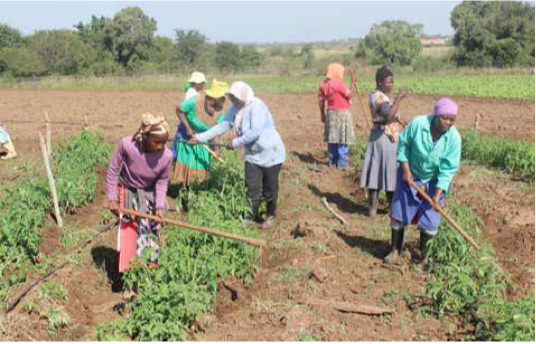What started off as a small project by women of Skwahlane outside Nelspruit to provide food at home has turned into a prosperous business employing 39 people and producing tomatoes, butternuts, spinach and more.
 In 1996 five women started what was known at the time as the Ikhwezi Women’s Association. The women were farming to pro- vide for their families, because of unemployment.
In 1996 five women started what was known at the time as the Ikhwezi Women’s Association. The women were farming to pro- vide for their families, because of unemployment.
They produced their vegetables on a 12 hectare farm some 60 kilometres from Nelspruit and donated by the local chief of Skwahlane. The farm has now grown into a viable business, employing 31 permanent and eight casual workers. Last year the cooperative scooped the Mpumalanga Productivity SA award for outstanding achievement in productivity improvement.
The women had to work hard to get to where they are now. In 2001 they decided to introduce four young people to their group to form what is now known as the Ikhwezi Agri-Cooperative. The aim of introducing more people to the project was to transfer farming skills and to build a sustainable business.
Makhosazane Sambo, who joined the cooperative in 2001, says that before joining the group, she was a general worker at a juice factory. “I heard that there was this opportunity to be involved in farming which was something very close to my heart since my father was a farmer. I decided to quit and become a member of the Ikhwezi Agri-Cooperative.”
In those early days, a lack of funding made it difficult to get the cooperative off the ground, recalls Sambo.
Things improved in 2006 when the Mpumalanga Department of Agriculture sponsored the cooperative with a bulldozer that was used to prepare the land.
In 2010, the group approached the Mpumalanga Department of Social Development for assistance and were granted R60 000.
“With that money we fenced off the property we were working from and also got a water pump for the crops”, says Sambo. She adds that the water pump improved their yield because the scarcity of water had badly affected their crops.
“We could see that our business was expanding and doing well and we were supplying to the Nelspruit National Market which supplies to all major chain stores around the province.
“In 2010 we approached the National Development Agency (NDA) for funding. With the money we received in 2011 we built an office block and a packing area. We also bought a freezer for the vegetables and a bakkie.”
Atypical day at Ikhwezi Agri-Village starts in the morning when workers head to the fields to look after their precious goods that will soon be sold all over Mpumalanga. On this particular day, the sun has reached 31
° C. Groups of workers wearing protective gear are hard at work, digging, weeding and reaping. The fields are covered with green crops waiting to be harvested.
Maxwell Mathebula, Mpumalanga Provincial Manager for the NDA, says Ikhwezi received R2 million from his organisation. In the last three years, the NDA has funded 44 food security projects and 65 small-scale cooperatives. In the ten years of its existence, the NDA has used over R1 billion to support communities through its programmes.
Mathebula expresses confidence that the members of the co-operative will continue to thrive.
“They have created job opportunities for community members and this is in line with the government priorities. The co-operative also addresses the issue of food security and nutrition. The vegetables that are produced are sufficient to change the lives of the poor while improving their nutritional status.” Sambo says for a cooperative to succeed, members must be given clearly defined roles.
“With the Ikhwezi-Agri Village Cooperative, members have special roles to play, looking after different aspects of the business such as finance, marketing and the daily running of the business. This makes working together easy as we work as an integrated system.”
Mathebula says a cooperative is a viable business model for farming as it works within a regulated framework.
“There is greater co-operation amongst members. There is an element of ownership and as a result members become committed to the cause. What is required to enhance this kind of co-operation is skills transfer. This includes leadership and management skills.”



 Facebook
Facebook Twitter
Twitter WhatsApp
WhatsApp